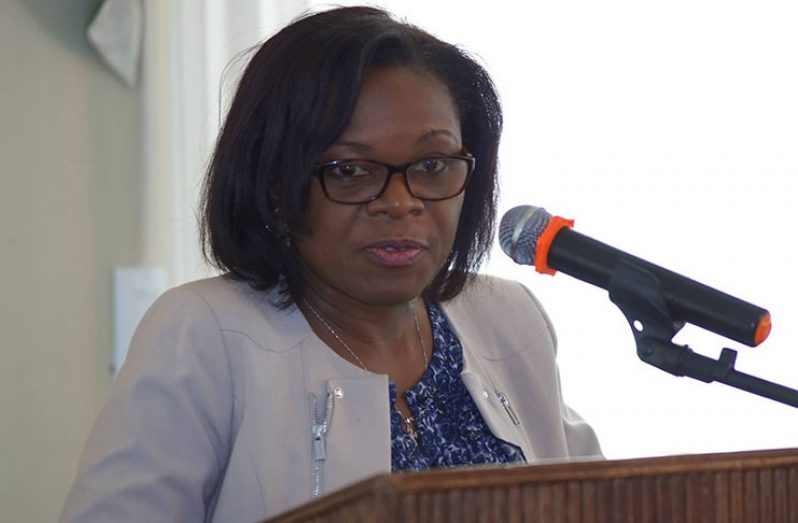GUYANA could soon join global trials for antibody treatment of the Novel Coronavirus (COVID-19) disease, said Deputy Chief Medical Officer (DCMO), Dr. Karen Boyle.
The COVID-19 pandemic has reached the shores of over 213 countries and in response to the disease, some of these nations have resorted to clinical trials of various types of treatment, such as the antibody treatment. “We are poised to possibly join some of these trials…the one we are interested in looking at is the transfusion of plasma of convalescent persons – meaning persons, who have been sick, and are winning the battle against the disease,” said Deputy Chief Medical Officer, Dr. Karen Boyle, in a recent recording released by the Ministry of Public Health.
Monoclonal antibody therapy is defined as a form of immunotherapy that uses monoclonal antibodies to bind monospecifically to certain cells or proteins. The objective is that this treatment will stimulate the patient’s immune system to attack those cells.
Dr. Boyle, in further breaking down the definition of this type of treatment, said it entails the transfusion of antibodies to ailing persons. “The plasma will be rich with antibodies…so it is basically like giving persons an immune boost, so it stands to reason that it should be helpful to people overcoming the disease,” said the DCMO.
The Ministry of Public Health has already engaged the Pan American Health Organisation (PAHO) about the intention and PAHO has since sent the necessary protocols. “So we are poised to start doing that,” said Dr. Boyle, adding that while this may be a major stepping stone in the fight against the disease, persons need to be cognisant that there is no approved cure for COVID-19.
According to a report from American public broadcaster, Public Broadcasting Service (PBS), convalescent plasma has shown enough promise against COVID-19 that hundreds of hospitals around the country have put it to use. While still considered an experimental treatment, patients are receiving convalescent plasma through clinical trials and by way of compassionate use, which the Food and Drug Administration expanded access to earlier this year.
The PBS report stated that convalescent plasma therapy dates back to the 1890s, when doctors transfused diphtheria patients with blood plasma from immunised animals. It was given to patients during the 1918 influenza pandemic and credited for stopping an outbreak of measles at a boarding school in Pennsylvania in 1934. It was used during the Ebola epidemic of 2014-2016, the recent H1N1 pandemic and outbreaks of SARS and MERS, two diseases also caused by coronaviruses.
Globally, there are over 2.8 million cases of COVID-19, with approximately 200,000 deaths. And with no approved treatment or cure, there is no assurance that persons will survive after contracting the disease. In the absence of approved medications, governments and authorities across the world have employed a number of preventative measures to contain the spread of the disease.
In an effort to improve the response to the pandemic, the local Public Health Ministry launched its mobile unit at the East La Penitence Health Centre as well as the community COVID-19 facilities of Region Four at Herstelling on the East Bank of Demerara and at Paradise on the East Coast of Demerara.
Additionally, government has extended its emergency measures to combat the dreaded disease, with the imposition of a 12-hour curfew on citizens. These emergency measures were taken pursuant to paragraphs (1) and (2) (b) of the directive issued by the President, in accordance with the Public Health Ordinance, Cap. 145, and published in the Official Gazette, Legal Supplement B, on March 16, 2020.
According to the WHO, COVID-19 is an infectious disease caused by the newly-discovered coronavirus.
The WHO said most people infected with the COVID-19 virus will experience mild to moderate respiratory illnesses and recover without requiring special treatment. Older persons and those with underlying medical problems such as cardiovascular disease, diabetes, chronic respiratory disease, and cancer, are more likely to develop serious illness.
The WHO believes that the best way to prevent and slow down transmission is to be well- informed about the virus, the disease it causes and how it is spread.
“Protect yourself and others from infection by washing your hands or using an alcohol- based rub frequently and not touching your face. The COVID-19 virus spreads primarily through droplets of saliva, or discharge from the nose when an infected person coughs or sneezes, so it’s important that you also practise respiratory etiquette (for example, by coughing into a flexed elbow),” the WHO has advised.



.jpg)











